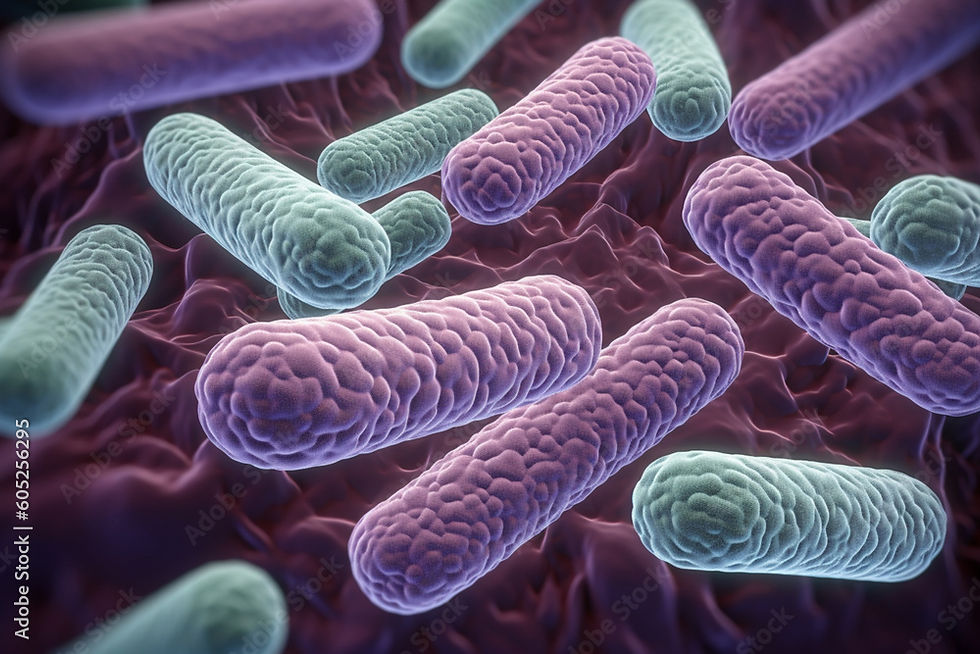Bifidobacterium: Ancient Allies for Gut Health
- NPSelection

- Nov 7, 2025
- 4 min read
Updated: Jan 26

Bifidobacterium (often referred to as Bifidus) is a genus of probiotic bacteria naturally found in the human gut, particularly in infants. It has been widely studied for its role in digestion and immunity. First discovered over a century ago, these bacteria remain central to our understanding of how beneficial microbes support human health.
The story of Bifidobacteria began in 1899, when Dr. Henry Tissier, a French paediatrician working at the Pasteur Institute, isolated a unique Y-shaped bacterium from the stools of healthy breastfed infants. He named it Bacillus bifidus communis. Tissier noticed that this bacterium was much more prevalent in healthy babies than in those suffering from diarrhoea and suggested its use as a probiotic treatment.
This discovery laid the foundation for future research into probiotic therapy and the role of the infant gut microbiome. The species was later reclassified into the genus Bifidobacterium, which now includes over 80 known species and subspecies.
Bifidobacteria are primarily found in the gastrointestinal tracts of mammals, with certain strains being host-specific. In humans, they are:
Most abundant in infants, particularly those who are breastfed, due to their ability to digest human milk oligosaccharides (HMOs).
Naturally present in healthy adults' colon and large intestine, though in lower abundance than in infants.
Present in traditional fermented foods, such as some yogurts and cultured dairy products.
They are also detected in fermented vegetables, infant formulas, and some probiotic supplements.
Gut Health Benefits
Bifidobacteria are considered cornerstone probiotics due to their numerous well-documented health benefits, including:
1. Digestive Support
Break down dietary fibre and resistant starch into short-chain fatty acids (like acetate), which nourish colon cells and support regular bowel movements.
Reduce symptoms of irritable bowel syndrome (IBS) and constipation.
2. Immune Modulation
Promote the development of regulatory T-cells, supporting a balanced immune response.
Strengthen the gut barrier and reduce inflammation.
3. Protection from Pathogens
It produces acetic acid, lowers intestinal pH, and inhibits harmful bacteria such as E. coli and Salmonella.
Compete for nutrients and attachment sites, providing a colonisation resistance effect.
4. Infant Health
Crucial in the development of the infant's immune system.
Help prevent necrotising enterocolitis in preterm infants when administered via probiotic drops.

Did you know?
Bifidobacteria were once so dominant in the guts of breastfed infants that early 20th-century scientists used their presence as a marker of a healthy baby, so much so that doctors prescribed Bifidus milk (milk fermented with bifidobacteria) to treat infant digestive issues long before the word “probiotic” even existed!

Role in Gut Health in Adults
Although bifidobacteria are most dominant in infancy, they continue to play a key role in adult gut health, particularly in maintaining microbial balance and supporting metabolic and immune functions.
Microbiota diversity: Adults with higher levels of bifidobacteria typically show a healthier and more diverse gut microbiota, which is associated with better outcomes in digestion, inflammation control, and
metabolic health.
Irritable bowel syndrome (IBS): Certain species, such as B. longum and B. bifidum, have been associated with reduced bloating, abdominal pain, and constipation in clinical studies.
Metabolic benefits: Bifidobacteria have been linked to improved glucose metabolism, reduced insulin resistance, and anti-obesity effects, especially when combined with dietary fibre.
Anti-inflammatory effects: In ageing adults, bifidobacteria can lower systemic inflammation by interacting with gut immune cells and producing anti-inflammatory metabolites.
Stress and mood: Emerging research suggests that bifidobacteria may influence the gut-brain axis, helping regulate mood and mental wellbeing, mainly when used alongside Lactobacillus species.
However, adult bifidobacterial levels tend to decline with age, antibiotic use, and low-fibre Western diets, making dietary support or probiotic supplementation(capsules or Bifido Yogurt) increasingly crucial in later life.
Do Bifidobacteria Permanently Colonise the Gut?
Unlike many other transient probiotics, particular species of Bifidobacteria are natural and persistent colonisers of the human gut, especially in infants.
Endogenous species like B. longum, B. bifidum, and B. breve are often already present in the gut and can persist or integrate with regular intake.
Some probiotic forms (e.g., derived from B. animalis) may not colonise long-term, but still exert beneficial effects during supplementation.
Overall, colonisation depends on species, host factors, and dietary context.
In summary: Some Bifidobacterium species are true colonisers, while others are beneficial transients — the effect depends on the specific species, host specifics, and how it’s delivered.
Food and Supplement Sources
Present in fermented dairy (e.g. Bifido yogurts)
Added to infant formula to mimic breast milk effects
Available in capsules, powders, or drops as probiotics
Found in multi-strain combinations alongside Lactobacillus and Streptococcus species
Bifidobacterium species are among the most well-researched, effective, and safe human probiotics. They are vital in early-life immune development, lifelong gut health, and disease resistance. While their numbers decline with age and a Western diet, targeted consumption through fermented foods or supplements can help restore and maintain a healthy gut ecosystem.
References:
Tissier, H. (1900). Recherches sur la flore intestinale des nourrissons. Thesis, Paris.
Ouwehand, A.C. et al. (2002). Probiotic and other functional microbes: from markets to mechanisms. Current Opinion in Biotechnology, 13(5), pp.483-487.
Sela, D.A. et al. (2008). The genome sequence of Bifidobacterium longum subsp. infantis reveals adaptations for milk utilization within the infant microbiome. PNAS, 105(48), pp.18964-18969.
Arboleya, S. et al. (2016). Bifidobacteria and Their Role as Members of the Human Gut Microbiota. Frontiers in Microbiology, 7, 925.
Staudacher, H.M. et al. (2017). Mechanisms and efficacy of dietary FODMAP restriction in IBS. Nature Reviews Gastroenterology & Hepatology, 14, pp.232–241.
Maldonado-Gómez, M.X. et al. (2016). Stable engraftment of Bifidobacterium longum in the human gut depends on individualized features of the resident microbiome. Cell Host & Microbe, 20(4), pp.515–526









































Comments